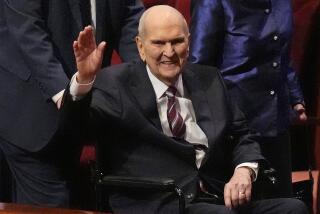Anniversary of Founder’s Death to Be Remembered : Mormons: Carthage, Ill., the site of Joseph Smith’s slaying 150 years ago, will be the focus of the ceremonies featuring church leaders.
- Share via
SALT LAKE CITY — On a muggy June afternoon in 1844, four Mormon men waited pensively in the upper room of a primitive Illinois jail. The prisoners talked of home, sang melancholy hymns and offered prayers.
Suddenly, gunfire shattered the quiet. Men with blackened faces stormed up the stairs, shooting through the door. In an instant, one man lay dead, another shot in the leg.
Joseph Smith, the 38-year-old founder of the Mormon Church, raced to the window, where he was shot. He wailed “Oh Lord, my God,” fell out the window, and died.
That scenario in the town of Carthage is known to Mormon faithful as “the Martyrdom,” the climax of a 14-year cycle of attacks and flight on the nascent Church of Jesus Christ of Latter-day Saints. And it permanently embedded a sense of persecution into the Mormon psyche.
This weekend Mormons will commemorate the 150th anniversary of their founder’s death. President Howard W. Hunter, current leader of the church, will be in Carthage for the anniversary activities.
In 1820, Joseph Smith was a farm boy in a region of Upstate New York known as the “burned-over district” because of the waves of religious revivals sweeping through the area.
At 14, Smith claimed that he had a vision of God and Jesus Christ, who told Smith all the churches had lost the true Christianity.
Three years later, Smith reported that an angel named Moroni directed him to find plates of gold, on which was written the history of a Hebrew family that migrated to the Americas and whose descendants were said to have been visited by the resurrected Jesus. Using spiritual tools, Smith reportedly translated the ancient writings into the Book of Mormon.
*
As soon as Smith began telling his story and selling the Book of Mormon, opposition arose among skeptics and offended Christians. He was derided as an impostor and a “money digger,” but his book of scripture hit a responsive note among many New York believers who sought a return to primitive Christianity stripped of dogma and cumbersome rituals.
Within 14 years, Smith’s following numbered in the thousands. They were chased from state to state, persecuted for their theological innovations, political unity, communal economics, and finally their social arrangements, which included a return to patriarchal polygamy.
At the center of it all was the charismatic Smith.
Harold Bloom, a preeminent American literary critic, says: “Mormon history is Joseph Smith, and his continued effect upon his saints.”
Comparing Smith to Ralph Waldo Emerson and Walt Whitman, Bloom calls him “an authentic religious genius” who “surpassed all Americans, before or since, in the possession and expression of what could be called the religion-making imagination.”
“What Whitman sang, Joseph Smith actually embodied,” Bloom said. “The ordeal of prophecy, perpetually embattled both inside and outside his movement, transmogrified the ardent idealist who composed the Book of Mormon. Smith matters permanently, to America and the world, because of the fierce alchemy he underwent from 1832 to 1844.”
By 1844, however, the antagonisms from Illinois neighbors and former Mormons boiled over into the murders of Smith and his older brother, Hyrum.
The Mormon movement was threatened with extinction. But the martyrdom renewed Mormon resolve, purged the group of all but the most determined, and propelled followers on a western exodus and expansion.
Today the Mormon Church has nearly 9 million members worldwide. But the founding events, and particularly the assassination of Smith, have left its mark on the inheritors of the faith.
Mormon hymns still sing of Joseph Smith, “who communed with Jehovah,” and who is even now in heaven pleading for his brethren.
*
The story of Smith is a “tragic tale that ends in spiritual triumph,” said Levi Peterson, a Mormon novelist and professor at Weber State University in Ogden, Utah.
After trekking about 1,200 miles to the Great Basin, the Mormons established themselves in the mountains of the Southwest. A movie entitled “Legacy” recounts the story of the church’s early persecution and now plays to packed movie houses in Utah.
“The martyrdom is still in the living mythology of the Mormons,” Peterson said. “Mormonism wouldn’t be what it is today if the martyrdom hadn’t sealed the conviction that Joseph Smith was telling the truth.”
More to Read
Sign up for Essential California
The most important California stories and recommendations in your inbox every morning.
You may occasionally receive promotional content from the Los Angeles Times.












